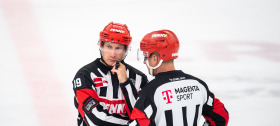General

Stick stroke
If one stabs one's opponent with the stick, then this is called a "stick stab". In this case, the attempt to stick counts as a foul. If the attempt is not successful, the player receives a double minor penalty and a disciplinary penalty. If the player performs the stick tackle, various penalties can be imposed: At least a major penalty and a game-time disciplinary penalty, and depending on the severity or injury of the opponent, a match penalty.
Swallow
Even in ice hockey, swallows are not particularly popular, but they do occur. The referee can punish such a deception with a minor penalty, but the opposing player may also fall down the wading tree.
Playing time
A game-time disciplinary penalty is imposed when a player commits a gross foul. This can be, for example, a check or a stick hit resulting in direct injury. If a player is penalised, the game is over for him and his team usually has to play with one less field player for five minutes.
Incorrect equipment
While the game is on the ice, all players must wear the correct equipment. For example, if a player loses his helmet, he must change immediately. The same applies to a broken stick, for example, which may also not be used for further play. It is also inadmissible to wear any item that is not part of the approved protective equipment."
Enforcer
"Enforcers" are ice hockey players who stand up for their team, e.g. in the form of hard checks or physical confrontations with opposing players. The motto is: "When the game gets tough, the tough play".
Bench penalties
In addition to personal penalties, which are imposed on a specific player for an offence, penalties can also be imposed on the team/the "bench". For example, a penalty for "too many players on the ice" or other offences that originate from the players' bench or officials and are detrimental to the game. The penalty must then be served by a player who was on the ice at the time of the offence.
Ice time
In ice hockey, there is a rolling rotation with up to four lines (two defensemen and three forwards). The players replace each other in the same position and spend different amounts of time on the ice. A player's ice time indicates how many minutes per game the player was involved in the action on the ice and can exceed 30 minutes for some top players.
Bodycheck
Term for a hard body check by a player against his opponent who is in front of the ice. The collision is executed with the upper body and has the goal of preventing the opponent from continuing the game. A body check may not be performed with the fist, knee, elbow or stick and must always be performed from the side or front.
Too many players on the ice
Each of the five field players may be substituted as often as necessary. Prerequisite: The player(s) wishing to leave the playing area must be within an imaginary area that is no more than 1.50 metres from the boards and limited to the length of the players' bench.
If, in the course of a player change, the player entering the court plays the puck, checks or physically touches a player of the opposing team while the player leaving the court is still on the court, this violation shall be penalised on the grounds of "too many players on the court".
High stick
A high stick is when a player's stick is carried above his shoulder height and thus hits an opponent. In the case of mere contact, a minor penalty is imposed on the player taking the stick. If the stick hit results in an injury or if the opponent is attacked purposefully, larger penalties are imposed depending on the situation.
Holding
Holding is when an opposing player is held with one or both arms, thus preventing his free movement on the field of play. It also includes pulling the jersey or using the legs without permission to hold the opponent. Holding is sanctioned with a minor penalty against the executing player.
Hook
If a player tries to prevent an opponent from moving with the help of his stick, it is a hook.
Leg kick
A leg kick is when an opponent is brought down unfairly. It does not matter whether the foul is committed with the stick, the leg or the foot. A minor penalty is imposed.
Guard check
If an opponent is pushed against the boards in an over-harsh manner, this is sanctioned with at least a minor penalty. The distance of the opponent from the boards is also decisive here: if he is far away from the boards and is checked hard, the risk of injury is higher - it is therefore a punishable foul. Depending on the severity or injury consequence, higher penalties can also be imposed.







